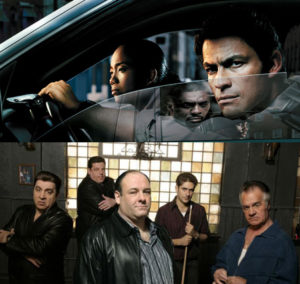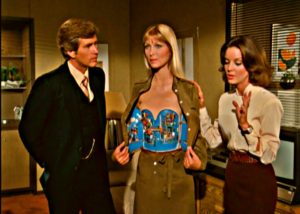For 38 years, Hollywood has drawn a bead on a film version of A Confederacy of Dunces, the Pulitzer-prize winning novel by John Kennedy Toole.
John Belushi was first set to play Ignatius J. Reilly, the ragin’ Cajun antihero of Dunces, but Belushi died of a drug overdose before shooting began. Same for Phillip Seymour Hoffman, the heir-apparent. Will Ferrell could not survive studio rights disputes, which doomed the most recent revival attempt. Nick Offerman came closest, playing the lugubrious lout onstage. 
But Ignatius remained something of a broadcast Bigfoot: an elusive creature as lovably loathsome as Royal Tenenbaum, but with a drawl and pet bird. Set in Louisiana, Dunces was that rare Southern Gothic tale that resisted retelling, at least electronically.
That’s a shame for Hollywood, which was beaten to the punch by Shit Town and its real-life antihero, John B. McLemore. Downloaded more than 70 million times, S-Town (as it’s known on Apple’s family-friendly podcast store) became the most downloaded podcast in history. Last winter, NPR compiled a list of 2017’s greatest podcasts — “that weren’t called S-Town.” It won the Peabody award for podcaster Brian Reed.
It would be hard arguing with the accolades heaped upon S-Town, or the acolytes heaping them. For a New York-based podcast (and podcaster), S-Town has a keen understanding of the language of the contemporary South and its inhabitants, who seem both bitterly resigned to the dismissal of twang while maintaining a rebel yell affection for the stereotype. I spent years as a reporter in Arkansas, and I can say, without bias: It’s plain weird to listen to a brilliant huckleberry. Mesmerizing, but weird.
If the seven-part podcast (which is, essentially, a return to radio theater) has a failing, it’s this: S-Town doesn’t know where it came from. The interstate exit may say Woodstock, Alabama. But those aren’t S-Town‘s roots. A Confederacy of Dunces is. That Reed never drew the parallel (or chose not to draw it) is an odd oversight.
But it’s impossible not to see the resemblance. Consider just a few quotes from the book, which oozes Ignatius’ hysterics, hypocrisy, arrogance and lumbering charm:
“Is my paranoia getting completely out of hand, or are you mongoloids really talking about me?”
“What I want is a good, strong monarchy with a tasteful and decent king who has some knowledge of theology and geometry and to cultivate a Rich Inner Life.”
“I am at the moment writing a lengthy indictment against our century. When my brain begins to reel from my literary labors, I make an occasional cheese dip.”
“Stop!’ I cried imploringly to my god-like mind.”
“Employers sense in me a denial of their values … they fear me. I suspect that they can see that I am forced to function in a century which i loathe.”
“I avoid that bleak first hour of the working day during which my still sluggish senses and body make every chore a penance. I find that in arriving later, the work which I do perform is of a much higher quality.”
McLemore’s rants are no less eloquent — or arrogant, abusive, hypocritical, insightful and beautifully hideous in their stark bravado:
“We ain’t nothing but a nation of goddamn chickenshit, horseshit, tattletale, pissy-ass, whiny, fat, flabby, out of shape, Facebook-looking damn twerkfest, peaking out the windows, and slipping around, listening in on the cellphones and spying in the peepholes and peeping in the crack of the goddamn door, and listening in the fucking sheet rock. You know, Mr. Putin, please show some fucking mercy. I mean, come on, drop a fucking bomb, won’t you?
I gotta have me some tea.”
But the real missed connection between book and podcast are their reliance on suicide. Toole’s book was published in 1980, after his mother found the manuscript following her son’s death. MAJOR SPOILER: S-Town, meanwhile, becomes less of a who-dunnit than a who-was-he after McLemore committed suicide by drinking cyanide.
And it’s here that S-Town owed Ignatius a nod. In the final ten minutes of S-Town, Reed recites an extended excerpt from John B.’s suicide note, which was found on the clock repairman’s computer. Some of it is transcribed here:
“I have not lived a spectacular life. But within my four-dozen-plus years, I’ve had many more hours to pursue that which I chose, instead of moiling over that which I detested.
I have coaxed many infirm clocks back to mellifluous life. Studied projective geometry, and built astrolabes, sundials, taught myself 19th-century electro plating, bronzing, patination, micro-machining, horology, learned piano. Read Poe, De Montpasa, Boccaccio, O’Connor, Welty, Hugo, Balzac, Kafka, Bataille, Gibran, as well as modern works by Mortimer, Hawking, Kuntsler, Klein, Jacoby, Heinberg, Hedges, Hitchings, and Rhodes.
But the best times of my life I realize were the times I spent in the forest and field. I have walked in solitude beside my own babbling creek, and wondered at the undulations, meanderings, and tiny atolls that were occasionally swept into its midst. I have spent time in idle palaver with violets, lyre leaf sage, heliopsis, and monkshood. And marveled at the mystery of monotropa uniflora. I have audited the discourse of the hickories, oaks, and pines, even when no wind was present. I have peregrinated the woods in winter, under the watchful guard of vigilant dogs, and spent hours entranced by the exquisiteness and delicacy of tiny mosses and molds: entire forests within a few square inches.
I have also run thrashing and flailing from yellow jackets. Before I could commence this discourse, I spent a few hours out under the night sky reacquainting myself with the constellations, like old friends. Sometimes I just spent hours playing my records. Sometimes I took my record players and CD players apart just to peek inside and admire the engineering of their incongruous entrails. Sometimes I watched Laverne and Shirley, or old movies, or Star Trek. Sometimes I sat in the dark and listened to the creaking of the old house.
I have lived on this blue orb now for about 17,600 days. And when I look around me and see the leaden dispiritedness that envelops so many persons both young and old, I know that if I die tonight, my life has been inestimably better than that of most of my compatriots. Additionally, my absence makes room, and leaves some resources for others, who deserve no less than I have enjoyed.
I would hope that all persons reading this can enjoy some of the aspects of life that I have enjoyed, as well as those aspects that I never will, and will take cognizance of the number of waking days he has remaining, and use them prudently.
To all that have given so much, much love and respect, John B. McLemore”
Just as Dunces became a national curiosity, so too has S-Town. Thousands flock to the stoplight town to visit McLemore’s Shining-like hedge maze.  They line his tombstone with fire-gilded coins, a perilous gold-plating process that may have slowly given McLemore mercury poisoning. The wife of the Woodstock mayor holds informal counseling sessions out of her home for the depressed.
They line his tombstone with fire-gilded coins, a perilous gold-plating process that may have slowly given McLemore mercury poisoning. The wife of the Woodstock mayor holds informal counseling sessions out of her home for the depressed.

So before Hollywood screws it up: A toast to the antihero, the South, god-like minds and gold-plated dimes. Keep railing, y’all.













